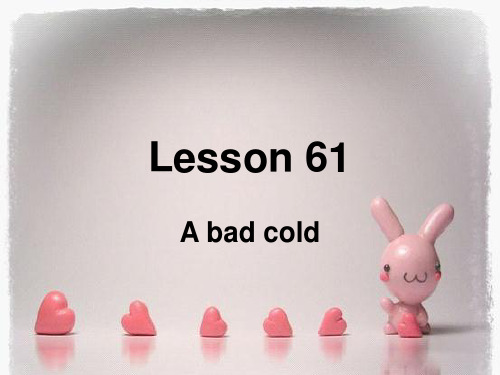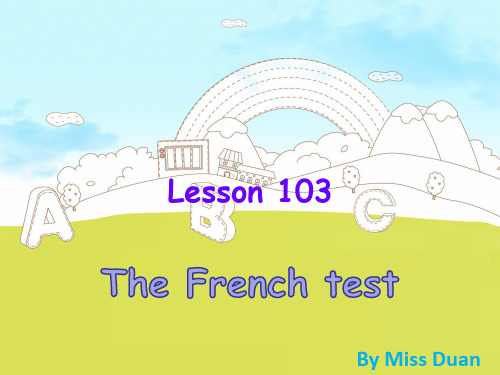新概念1册 nce1-lesson(课堂PPT)
合集下载
新概念1册 nce1-lesson(课堂PPT)

63
Germany
64
France
65
England
66
Greece
67
Brazil [brə'zil] 巴西
the US
68
Holland ['hɒlənd] 荷兰
England ['iŋɡlənd] 英国
69
France [frɑːns] 法国
Germany ['dʒɜːmənɪ]德国
the birthday of our Party July
Valentine’s Day February Army Day August
21
Travel the world.
② ③ ⑩⑦
①
④
⑧⑤
⑥ ⑨⑿
⑾
22
Country 国家
23
Germany 德国 24
Holland 荷兰
25
Spain 西班牙
spring
summer
autumn
winter
12
summer winter spring
autumn
13
['snəʊɪ]
['klaʊdɪ] ['wɪndɪ]
weather ['weðə]
14
Every season has three months.
15
16
17
18
How many months in a year? What are they? October 2014 April
What's the climate like in your country?
49
Germany
64
France
65
England
66
Greece
67
Brazil [brə'zil] 巴西
the US
68
Holland ['hɒlənd] 荷兰
England ['iŋɡlənd] 英国
69
France [frɑːns] 法国
Germany ['dʒɜːmənɪ]德国
the birthday of our Party July
Valentine’s Day February Army Day August
21
Travel the world.
② ③ ⑩⑦
①
④
⑧⑤
⑥ ⑨⑿
⑾
22
Country 国家
23
Germany 德国 24
Holland 荷兰
25
Spain 西班牙
spring
summer
autumn
winter
12
summer winter spring
autumn
13
['snəʊɪ]
['klaʊdɪ] ['wɪndɪ]
weather ['weðə]
14
Every season has three months.
15
16
17
18
How many months in a year? What are they? October 2014 April
What's the climate like in your country?
49
新概念英语NCE1_lesson119-120(共20页)课件

• sb happen to do sth 某人碰巧做某事 • 我忘记带着我的钢笔了,而她碰巧有一支备用
的。
• I forgot to bring my pen with me. She happened to have a spare one
• 我昨天把前门的钥匙弄丢了,妈妈碰巧在花园 里发现了它。
• He wrote the letter as clearly as he could • 她尽可能地把车开快
• She drove as fast as the could.
• George heard the noise and came downstairs quickly.
• heard the noise 听到声响 • came downstairs 下楼来
• After they had entered the house, they went into the dinning room. It was very dark, so they turned on a torch.
• turn on a torch 打开手电筒。
• Suddenly, they heard a voice behind them. ’What’s up? What’s up?’ someone called.
• run away 跑开了,跑掉了,逃跑 • 别跑!我有好事要告诉你。
• Don’t run away. I have something nice to tell you. • --as quickly as they could 能跑多快就跑多快。 • 我尽量地多带东西。
• I try to bring as many things as I can. • 他尽量清楚地写这封信。
新概念英语第一册精品课件PPT NCE1_lesson135-136(共32页)

• • • • •
Listen and make true or false. 1) Miss Marsh has a future husband. T 2) His name is Carl. F 3) He was her fifth’s husband. F 4) Her future husband allowed her to make another film. F • 5) The sensational news was Miss Marsh might retire. T
sensational news her sixth husband
Liz and Kate are talking about the latest report about Karen Marsh….
report about Karen Marsh. There is a sensational _______ hotel today, she told _________ reporters At her London _____ might______ retire and she couldn’t ______ make ___ up she______ her mind She would ____ have to ask her ______ ____ _____. ___ future husband. She said her future husband would not ___ _________ him to the lether make _______ another film. She introduced get _______ married reporters and told them they would ______ the next week. sensational news Liz and Kate thought that was __________ _______. sixth ________. husband And Carlos would be her _______
NCE1_lesson139-140(共16页)新概念英语第1册课件

Asking questions
1.
T: Ask me if John understands?
S: Does John understand?
T: Why doesn’t---? S: Why doesn’t John understand? T: Ask me if Mary invited them to dinner.
3.
What time did he say he would be at their house?
He said he’d be there at six.
4.
Why does he say he’ll be late?
Because the boss wants him todo some extra work.
②
由疑问代词和疑问副词引导的宾语从句 疑问代词和疑问副词主要有:what, when, how, where, how often, how much, how soon (多快, 多久), how long等。 Do you know? When will the film be on? Do you know when the film will be on? 主从句的事态要一致。 I told him. I would go to Europe next week.
6.
7.
8.
9. 10. 11.
12.
want to do sth./want sb. to do sth. extra [‘ adj. 额外的 e.g. We have a teacher at my school who gives us extra lessons sometimes. 我们学校里有名老师有时给我们上一些额外的课程。 stay at the office 留在办公室 stay (at) home 呆在家里 by the way 顺便(问,说) talk about 谈论 overseas [‘ a.海外的,国外的 overseas Chinese 华侨,海外华人 engineer [,dZ‘ n. 工程师 engineering [,dZ n.工程
新概念英语NCE1_lesson69-70-71-72(共23页)课件

I get up at 7 o'clock every morning. Then I crowd into the bus.
Stand v. 站立,矗立,站住
• 火车上非常拥挤,我不得不一路站到伦敦 The train was so crowded that I had to stand all the way to London.
充当beat的宾语的则是比赛、竞争的对手,即指人 或球队的名词或代词。 例如:We played very well,and we beat them.我们 发挥很好,打败了他们。
behind prep. 在……之后
in front of
在……之前
我把雨伞放在了门后面。
I put the umbrella behind the door.
• 这里曾经有一棵大树。 A tall tree once stood here.
stand out 突出/显眼/引人注目 outstanding杰出的 stand by 支持;袖手旁观 stand for 代表/象征 stand in 代替;替身演员 stand off 疏远/远离/避开
exciting 令人兴奋的,使人激动的 (修饰物)
形容词
辨析
例句
interested interesting
说明人等因外部 原因产生某种情 感或状态,以人做 主语
说明事物等本身 的性质与特征, 以物做主语
I‘m interested in sports.我对运动 很感兴趣。
It is an interesting film.这是部有趣 的电影。
finish
crowd n. 人群; v.挤上去
• in the crowd
新概念英语NCE1_lesson127-128(共14页)课件

• at least 至少 • ① 至少 • 这只古花瓶至少价值两万英镑。
• This antique vase is worth at least 20,000. • 至少你应该考虑一下我们的建议。
• At least, you should consider our suggestions. • ② 反正;无论如何;不管怎样 • 他尚未有出国的计划,至少据我所知是这样的。
• The story can’t be true. • have another look 再看一看 • have a look 看一眼 • 让我看一眼那本书。
• Let me have a look at that book.
• I think you’re right! Isn’t he her third husband? • Isn’t he her third husband? • No. He must be her fourth or fifth. • must be 表示推测,有较强肯定意味。 • her fourth or fifth = her fourth husband or fifth
• It is hard to read him.
课文讲解
• Can you recognize that woman, Liz? • can 能 • 她会开车,但不会骑自行车。
• She can drive, but she can’t ride a bicycle. • Can you…. 表示请求 • 你能借我10美元吗?
husband • Doesn’t Karen Marsh look old! • 她看起来健康。
• She looks well. • 她看起来不错。
2024年新概念英语NCE1_lesson119-120(共33页)课件

4. Paul went(go) out with Jane after he had made(make) a phone call.
5. They had learned(learn) over 2000 words by the end of last term.
6. I have a lot of work to do(do).
(D)3. She said she ___the principle already.
A .has seen
B. saw
C. will see D.had seen
(D)4.A friend of ___ is a doctor. A.me B.my C.I D.mine
(C)5. She had written a number of books ______ the end of last year. A.for B.in C.by D.on
4.当安下楼时,小偷已走开了。 When Ann came downstairs,the theif ___ already ____.
1.我要给你讲一个真实的故事。 I want to tell you a true story.
2.当他到达车站时,火车已离开了。 When he got to the station,the train had already gone.
questions
1.When did two thieves climb into the kitchen?
2.How is Henry?
happen
1.A car accident happened to her
this morning.
2.What happened to you? 3.What happened to Helen last night? 4.I am very sorry for all happened to
NCE1_Lesson107-108(共45页)新概念英语第1册课件

Key words and expressions
•
★madam(对妇女的尊称名词)夫人,女士 服务行业的人员常用此称呼;同时,对于不 知姓名的女士也可以用此来表示尊重。这个 单词也可拼作ma'am [mæm]. Do you like this dress,madam? What can I do for you,madam?
Let’s review—A card from Jimmy
• • • • • • • • • --Read Jimmy's card to me please, Penny. --I have just arrived in Scotland and I'm staying at a Youth Hostel.’ --Eh? --He says he's just arrived in Scotland. He says he's staying at a Youth Hostel. You know he's a member of the Y.H.A. --The what? --The Y.H.A., Mum. The Youth Hostels Association.
• --What's it?
• --It's a dictionary. I hope it'll help you.
Key words and expressions
• • • • • madam n. 夫人,女士 smart adj. 漂亮的 as well 同样 suit v. 适于 pretty adj. 漂亮的
Key words and expressions
★pretty (形容词)漂亮的
新概念英语NCE1_lesson119-120(共20页)课件

• It so happened that the famous actor was her brother.
• thief n. 贼 • 小偷偷走了我的全部钱财 • A thief stole all my money. • thief的复数形式:thieves
• robber
使用暴力抢夺他人财物的强盗
• happen v. • 1)发生 • 那是怎么发生的?
• How did it happen? • 2) 碰巧 • 我碰巧在街上见到他。
• I happened to see him on the street. • It (so) happens + that…. 碰巧… • 那个有名的演员碰巧是她的哥哥。
•
• dark • 1) adj. 黑暗的 • 太暗了,无法看书
• It’s too dark to read. • 2) 深色的,暗色的 • 她的眼睛是深色的。
• She has dark eyes. • 3) 阴暗的,忧郁的,暗淡的 • The future looked dark in those days. • 那时觉得前途暗淡。 • 4)n. 黄昏,傍晚,黑夜(通常不加冠词) • before dark 天黑以前
• housebreaker 侵入屋内抢劫财物的强盗
• enter v. • 1) 进入 • 她悄悄地进入屋中。 • She entered the room quietly. • 2)加入…,参加 • 他21岁上了大学。 • He entered the university at the age of 21. • at the age of ….在….岁的时候 • Enter for 报名参加 • 很多学生报名参加这个竞赛。 • Many students entered for this competition.
• thief n. 贼 • 小偷偷走了我的全部钱财 • A thief stole all my money. • thief的复数形式:thieves
• robber
使用暴力抢夺他人财物的强盗
• happen v. • 1)发生 • 那是怎么发生的?
• How did it happen? • 2) 碰巧 • 我碰巧在街上见到他。
• I happened to see him on the street. • It (so) happens + that…. 碰巧… • 那个有名的演员碰巧是她的哥哥。
•
• dark • 1) adj. 黑暗的 • 太暗了,无法看书
• It’s too dark to read. • 2) 深色的,暗色的 • 她的眼睛是深色的。
• She has dark eyes. • 3) 阴暗的,忧郁的,暗淡的 • The future looked dark in those days. • 那时觉得前途暗淡。 • 4)n. 黄昏,傍晚,黑夜(通常不加冠词) • before dark 天黑以前
• housebreaker 侵入屋内抢劫财物的强盗
• enter v. • 1) 进入 • 她悄悄地进入屋中。 • She entered the room quietly. • 2)加入…,参加 • 他21岁上了大学。 • He entered the university at the age of 21. • at the age of ….在….岁的时候 • Enter for 报名参加 • 很多学生报名参加这个竞赛。 • Many students entered for this competition.
NCE1_lesson111-112(共38页)新概念英语第1册课件

model [‘mɒdl] n.型号、式样, 模型, 模特
• • • • • • 这台电视是最新型的。 This television is the latest model. 飞机模型、火车模型 model plane 凯特是个模特。 Kate is a model.
afford [ə'fɔ:d] v.付得起(钱) 有足够的(金钱,时间)做 • 我们买不起新车。 • We can’t afford a new car. • We can’t afford to buy a new car.
• afford + n. • afford + to do
deposit [di'pɒzit] n.预付定金、押金、保证金 (通常以单数形式表示)付款 v.付定金,存钱
• 我付了1500美金作为购新车的定金。 • I pay a deposit of $1,500 for this new car.
• MR. FRITH: I like this television very much . • How much does it cost ? • ASSISTANT: It's the most expensive modelin • the shop. It costs five hundred pounds. • MRS. FRITH: That's too expensive for us. • We can't afford all that money .
4/5/2018
不规则变化
1.good/well – better – the best 2.bad - worse - the worst 3.many/ much – more – the most 4.little – less - the least
新概念英语NCE1_lesson61-62(共27页)课件

If you want your lips sexy, you should always say something good of others.
If you want to keep a good figure, you should always share the food with others.
★ Call v. 称作,打电话,叫(人或车) What do you call this flower? Call the doctor. Call me a taxi, please. Call me at 7. You can call me anytime. I’ll call you back.
Remember your appointment with the dentist.
Remember to do sth 记得去做某事 Remember doing sth 记得做过某事 I remember you saying so.
Please remember to send me an email.
John's mother told him to look after his younger brother.
Please take good care of yourself.
★remember v. 记得,记住 (forget) ① v. 记得;回忆 I remember he used to dress in a blue suit. ② v. 记住;牢记;不忘记 I tried hard to remember the long passage of Shakespeare.
★ doctor n. 医生 我女儿是一个医生。
★look v. 看(起来) 有关短语: • look at sth 看某物
If you want to keep a good figure, you should always share the food with others.
★ Call v. 称作,打电话,叫(人或车) What do you call this flower? Call the doctor. Call me a taxi, please. Call me at 7. You can call me anytime. I’ll call you back.
Remember your appointment with the dentist.
Remember to do sth 记得去做某事 Remember doing sth 记得做过某事 I remember you saying so.
Please remember to send me an email.
John's mother told him to look after his younger brother.
Please take good care of yourself.
★remember v. 记得,记住 (forget) ① v. 记得;回忆 I remember he used to dress in a blue suit. ② v. 记住;牢记;不忘记 I tried hard to remember the long passage of Shakespeare.
★ doctor n. 医生 我女儿是一个医生。
★look v. 看(起来) 有关短语: • look at sth 看某物
新概念英语NCE1_Lesson103-104(共46页)课件

真容易! So easy!
difficult [difikəlt] adj. 困难的 反义词 easy difficult to do 做……是困难的
e.g. 这个问题很难回答。 The question is difficult to answer.
enough [i`nʌf] adj. 充足的 足够的时间 enough time 足够的钱 enough money 结构:enough + n.
examination:是很正式的词。
test:是指除正规考试外,对学生所学知识的测 验,有时也取代正规考试。
pass [pa:s] v. 及格,通过 e.g. 只有十名学生通过了考试。 Only ten students passed the exam.
pass in + 具体学科 pass in English / Chinese
pretty enough
结构: adj. + enough 足够…
e.g. 这个房间我们住足够大了。 This room is big enough to live in.
e.g.你还太小,不能做这件事。 You are not old enough to do it.
paper [`peipə] n.
e.g. 对他来说,学习英语很容易。 It is easy for him to learn English.
e.g.对Lucy 来说学数学不容易。 It is not easy for Lucy to learn mathematics.
口语: 随便,那个都行。 I’ m easy.
放心好了,别着急。 Take it easy.
(1) [U] 纸 一张纸 a piece/ sheet of paper 三张纸 three pieces of paper
difficult [difikəlt] adj. 困难的 反义词 easy difficult to do 做……是困难的
e.g. 这个问题很难回答。 The question is difficult to answer.
enough [i`nʌf] adj. 充足的 足够的时间 enough time 足够的钱 enough money 结构:enough + n.
examination:是很正式的词。
test:是指除正规考试外,对学生所学知识的测 验,有时也取代正规考试。
pass [pa:s] v. 及格,通过 e.g. 只有十名学生通过了考试。 Only ten students passed the exam.
pass in + 具体学科 pass in English / Chinese
pretty enough
结构: adj. + enough 足够…
e.g. 这个房间我们住足够大了。 This room is big enough to live in.
e.g.你还太小,不能做这件事。 You are not old enough to do it.
paper [`peipə] n.
e.g. 对他来说,学习英语很容易。 It is easy for him to learn English.
e.g.对Lucy 来说学数学不容易。 It is not easy for Lucy to learn mathematics.
口语: 随便,那个都行。 I’ m easy.
放心好了,别着急。 Take it easy.
(1) [U] 纸 一张纸 a piece/ sheet of paper 三张纸 three pieces of paper
新概念英语NCE1_lesson123-124(共14页)课件

• apply for a job / hunt for a job • 失业
• lose one’s job • 辞职
• quit a job • 2. n. 份内事 • 洗盘子是你份内的事。
• It’s your job to do the dishes.
• guess v. 猜 • 你猜得出它花了多少钱吗?
• during prep. 在…期间 • 休假期间,我到海里游了两次泳。
• I went swimming in the sea twice during the vacation.
• 下了一整夜的雨。
• It rained during the night. • 整个用餐时间她讲个不停。 • She kept on talking during the meal。
• Let me see it, Mike.
• =Let me have a look at it.
• This is a good photograph. Who are these people?
• They’re people I met during the trip. • 由于先行词people在从句中是作动词met 的宾
因此不可以省略。 • offer sb sth 为某人提供… • 他们为我在那家公司提供一个职位。 • They offered me a position in that company.
• Who's this? • Guess! • It’s not you, is it? • 反意疑问句,前面一句用肯定句,后面一句用
语,因此引导词whom或who被略了。
• That’s the ship we traveled on. • ship作从句中travelled on的宾语,因此省略了
• lose one’s job • 辞职
• quit a job • 2. n. 份内事 • 洗盘子是你份内的事。
• It’s your job to do the dishes.
• guess v. 猜 • 你猜得出它花了多少钱吗?
• during prep. 在…期间 • 休假期间,我到海里游了两次泳。
• I went swimming in the sea twice during the vacation.
• 下了一整夜的雨。
• It rained during the night. • 整个用餐时间她讲个不停。 • She kept on talking during the meal。
• Let me see it, Mike.
• =Let me have a look at it.
• This is a good photograph. Who are these people?
• They’re people I met during the trip. • 由于先行词people在从句中是作动词met 的宾
因此不可以省略。 • offer sb sth 为某人提供… • 他们为我在那家公司提供一个职位。 • They offered me a position in that company.
• Who's this? • Guess! • It’s not you, is it? • 反意疑问句,前面一句用肯定句,后面一句用
语,因此引导词whom或who被略了。
• That’s the ship we traveled on. • ship作从句中travelled on的宾语,因此省略了
新概念英语第一册精品课件PPT NCE1_Lesson103-104(共48页)

paper cups
mark n.记号, 分数
The highest mark was a A+. 最高分数为A+.
好成绩 好分数 good marks
高分数 high marks
低分数 low marks
low adj.低的, 少的
a low mark 分数(成绩)低 【反】high 高的
【反】 loud (声音)高的
top n. 顶;上部
top←反义词→bottom
at the top of 在…的顶端
Write your name at the top of the paper. 把你的名字写在纸的上端。
He stood at the top of the mountain.
他站在了山顶上
New words and expressions:
pass←→past?
fail v. /feil/ 失败; 不及格
我数学及格, 但英语不及格. I passed in math but failed in English.
mathematics
/mæ өə`mætiks/ n.数学
缩写 [Uk] maths [Us] math
His mathematics is strong. 他的计算能力很 强。
enough /i`nΔf/ adv.足够地,充分地
good enough 足够好 big enough 足够大
adj. + enough 足够….
This room is big enough for us to live .
enough 足够地,副词,修饰形容词,用在形容词之后: easy enough
新概念英语NCE1_lesson139-140(共22页)课件

5 I don't know. Are they going fishing?
1. B
2.I don’t know when I’ll finish. 3.I don’t know what you are talking about. 4.1 这些句子是___________从句。 5.2 在句中引导词分别为___________。 6.3 这些引导词分别引导什么类型的句子? 7.4 将下列句子变成宾语从句。
1 He wants to know. Are you a teacher?
2 Is Sally American? Our teacher wants to know.
3 My parents told me. You can play computer on Sundays?
4 Mike said. I’m very busy now.
1 Is Graham Turner speaking to John Smith? 2 What does Graham Turner ask John Smith to tell Mary? 3 What time did he say he would be at their house? 4 Why does he say he’ll be late? 5 When will he finish? 6 What does the speaker’s wife want to know? 7 What doesn’t John Smith understand? 8 Is he John Smith, the engineer? 9 Is he from the Overseas Engineering Company?
yao~yao~
1. B
2.I don’t know when I’ll finish. 3.I don’t know what you are talking about. 4.1 这些句子是___________从句。 5.2 在句中引导词分别为___________。 6.3 这些引导词分别引导什么类型的句子? 7.4 将下列句子变成宾语从句。
1 He wants to know. Are you a teacher?
2 Is Sally American? Our teacher wants to know.
3 My parents told me. You can play computer on Sundays?
4 Mike said. I’m very busy now.
1 Is Graham Turner speaking to John Smith? 2 What does Graham Turner ask John Smith to tell Mary? 3 What time did he say he would be at their house? 4 Why does he say he’ll be late? 5 When will he finish? 6 What does the speaker’s wife want to know? 7 What doesn’t John Smith understand? 8 Is he John Smith, the engineer? 9 Is he from the Overseas Engineering Company?
yao~yao~
相关主题
- 1、下载文档前请自行甄别文档内容的完整性,平台不提供额外的编辑、内容补充、找答案等附加服务。
- 2、"仅部分预览"的文档,不可在线预览部分如存在完整性等问题,可反馈申请退款(可完整预览的文档不适用该条件!)。
- 3、如文档侵犯您的权益,请联系客服反馈,我们会尽快为您处理(人工客服工作时间:9:00-18:30)。
spring
summer
autumn
winter
12
summer winter spring
autumn
13
['snəʊɪ]
['klaʊdɪ] ['wɪndɪ]
weather ['weðə]
14
Every season has three months.
15
16
17
18
How many months in a year? What are they? October 2014 April
Snow
Rain
Cold
9
What’s the weather like in… ? It’s …
10
spring [sprɪŋ] seasons summer['sʌmə]
['siːzən]
autumn ['ɔːtəm]
winter ['wɪntə1]1
What’s the weather like in different seasons? What’s the weather like in different seasons?
﹪
10 20 30 40 50 60 70 80 90 100
47
Fill in the blanks with next words.
always often sometimes
In Greece, it____o_fte_n_windy in March, and it’s __a_lw_ay_s_warm in spring, it rains______s_o_m_et_im_e_s . In summer, it’s___a_lw_ay_s_hot. The climate in autumn is __al_wa_y_s_warm, but in November, it _o_ft_en___cold and rains______s_o_m_et_im_e.sIn winter, it’s ____o_ft_ecn old and snows_______so_m_e_tim. es
What's the climate like in your country?
49
或询问人物或事物的外观或特征: What's your brother like? 你兄弟是个什么样子? What's your house like? 你的房子是什么样的?
许多形容词可用以回答What…like? 这 样的问题,并可根据上下文给以笼统 的或确切的信息。例如课文中表示天 气或气候的形容词有pleasant(宜人 的),windy(有风的),hot(热
Thanksgiving Day November
National Day Labors’ Day April Fool's Day Christmas Day
October May April December
New Year's Festival January
Children's Day
June
19
November April October May August January December February March July September June
一月
二月
三月
四月
五月
六月
七月
八月
九月
十月
十一月
十二月
20
Teacher's Day Women's Day
September March
德国 Russia 俄罗斯
Holland 荷兰 Italy 意大利
Spain 西班牙 the U. S. 美
Brazil 巴西
Sweden 瑞典
Norway 挪威
France 法国
U. K.英国
39
Sweden
Germany Russia
Norway
Brazil the U. S.
Italy
France
Review
1
butcher meat beef lamb husband steak
卖肉的 肉 牛肉 羔羊肉 丈夫 牛排
2
mince chicken tell truth either
肉馅 鸡 告诉 实情 也不
3
4
Lesson 51
5
What’s the weather like?
Pop kids
Holland
Spain
U. K.
40
41
1.Where do you come from? I come from________.
42
2.What’s the weather like in_________? It’s ____.
43
46
频率 副词
sometime s
often
always
the birthday of our Party July
Valentine’s Day February Army Day August
21
Travel the world.
② ③ ⑩⑦
①
④
⑧⑤
⑥ ⑨⑿
⑾
22Biblioteka Country 国家23
Germany 德国 24
Holland 荷兰
25
Spain 西班牙
48
语法 Grammar in use
What…(be. look, etc.) like? 我们把What…like? 这一句型用于询 问事物的状况,例如天气、气候等:
What's the weather like today? 今天天气怎么样?
What's it like today? 今天怎么样?
snow
sunny
6
What’s the weather like?
Pop kids
rain windy
7
What’s the weather like?
cold hot
8
What’s the weather like? What’s the weather like?
Sunny Windy
Hot
50
的),cold(冷的),warm(温暖的)
一般现在时,表示通常性、规律性、 习惯性的状态或者动作的一种时态,常 与always, often, usually, sometimes, every day等连用。
26
the U. S. 美国
27
Russia 俄罗斯
28
Brazil 巴西 29
Norway 挪威
30
Italy 意大利
31
U. K.英国
32
33
34
35
France 法国
36
Sweden 瑞典
37
美国 巴西
挪威 瑞典
芬兰
俄罗斯
荷兰
英国 德国
法国
西班牙
希腊
意大利
38
Germany
